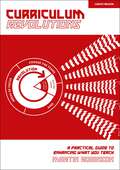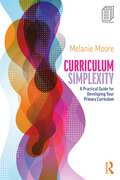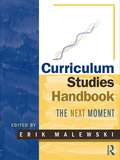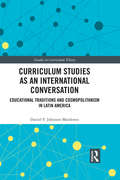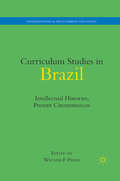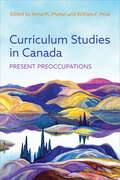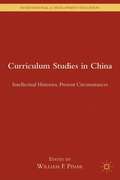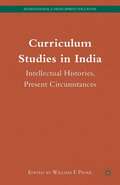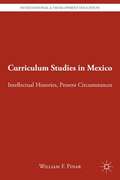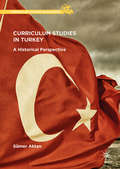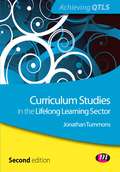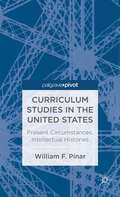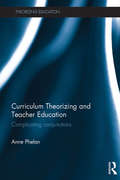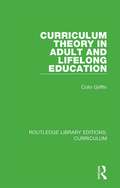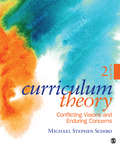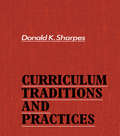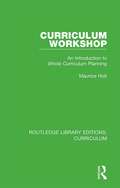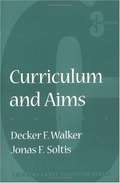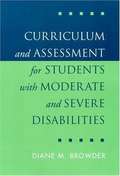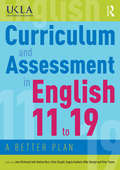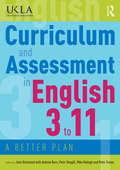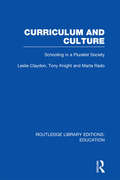- Table View
- List View
Curriculum Revolutions: A practical guide to enhancing what you teach
by Martin RobinsonCurriculum Revolutions is a tool to assist schools in creating, building and maintaining a joined-up curriculum that is cohesive and coherent. Martin Robinson's unique curriculum wheel leads you through a continuous cycle of planning, designing, delivering, reflecting upon and reviewing your curriculum. The process will involve your managers, teachers and pupils, ensuring all understand the importance of a well-functioning curriculum as the cornerstone of the school and the quality of education it delivers. Good curriculum design is a collaborative affair, so each revolution of the wheel focuses on how to get staff working together productively. Most importantly, from a design point of view, Curriculum Revolutions explores the potential pitfalls in the curriculum shape that a school adopts, either consciously or unconsciously. Robinson argues that a sophisticated understanding of the underlying structure, or 'thought architecture', can make all the difference to the quality of the continuing, unfolding project of good curriculum design.
Curriculum Simplexity: A Practical Guide for Developing Your Primary Curriculum
by Melanie MooreAre you a busy teacher, subject lead or senior leader looking to improve your curriculum? Based on the theory of simplexity, the idea that clarity and logic can make even the most complex tasks manageable, Curriculum Simplexity offers a practical and systematic planning aid, guiding readers through the process of building a robust, coherent whole-school curriculum. Recognising the role of teachers’ autonomy and professional judgement, this essential read provides space for the flexibility and creativity needed for teachers to reflect their own values, content, aims and outcomes within the curriculum.Divided into a series of easily digestible chapters and filled with templates, worked examples and planning formats, this book unpacks the process of creating a curriculum. Topics explored include, but are not limited to: The importance of pedagogy Good subject leadership Building a curriculum progression framework Implementing, delivering and evaluating your curriculum Assessment Highly practical and written in an accessible style, teachers are encouraged to reflect on their curriculum planning, development and delivery. This is an essential read for any teacher, subject lead or senior leader who wishes to improve their curriculum and support positive learning outcomes within their school.
Curriculum Studies
by Jonathan TummonsCurriculum is a key issue for trainee teachers in the Lifelong Learning Sector and a core component of most courses. It lies at the heart of the work of teachers and trainers, it shapes the programmes and courses that are taught, and dictates which students can have access to courses. What goes in to the curriculum is argued over by governments, employers, parents and educationalists. How the curriculum is funded can change on a yearly basis. Access to a particular curriculum can raise or diminish the life chances of the learners involved. This book provides an accessible and up to date overview of the key issues surrounding the curriculum. Written for all those working towards QTLS, it provides examples and case studies from working FE colleges, adult education centres and work-based learning contexts as well as offering succinct summaries of key theories and debates relating to the curriculum. This fully revised second edition reflects the latest policies and thinking, has a new chapter on the implications of e-learning on curricula, and includes a full glossary of key terms and concepts. Jonathan Tummons has worked in higher education since 1995. After six years as a lecturer in teacher education in the further education sector, in 2009 he took up his current post as senior lecturer in education at Teesside University where he is also research co-ordinator for education and a member of the management board for the Social Futures Institute, Teesside's research centre for the social sciences.
Curriculum Studies Handbook - The Next Moment (Studies in Curriculum Theory Series)
by Erik MalewskiWhat comes after the reconceptualization of curriculum studies? What is the contribution of the next wave of curriculum scholars? Comprehensive and on the cutting edge, this Handbook speaks to these questions and extends the conversation on present and future directions in curriculum studies through the work of twenty-four newer scholars who explore, each in their own unique ways, the present moment in curriculum studies. To contextualize the work of this up-and-coming generation, each chapter is paired with a shorter response by a well-known scholar in the field, provoking an intra-/inter-generational exchange that illuminates both historical trajectories and upcoming moments. From theorizing at the crossroads of feminist thought and post-colonialism to new perspectives that include critical race, currere, queer southern studies, Black feminist cultural analysis, post-structural policy studies, spiritual ecology, and East-West international philosophies, present and future directions in the U.S. American field are revealed.
Curriculum Studies as an International Conversation: Educational Traditions and Cosmopolitanism in Latin America (Studies in Curriculum Theory Series)
by Daniel F. Johnson-MardonesExamining Curriculum Studies from an international perspective, this book focuses on the relations between the Anglo-Saxon and Latin American educational traditions. Informed by William F. Pinar’s conceptualization of curriculum as currere, Johnson-Mardones reconsiders curriculum as an international conversation and advances an intercultural dialogue among educational traditions to put forth a more comprehensive and inclusive theory of curriculum. Moving beyond the Anglo-Saxon space and into the Global South, Johnson-Mardones brings in his own non-Western educational experience to the center of this inquiry, and situates cosmopolitanism as a necessary but complex component of Curriculum Studies.
Curriculum Studies in Brazil: Intellectual Histories, Present Circumstances (International and Development Education)
by William F. PinarThis collection, comprised of chapters focused on the intellectual histories and present circumstances of curriculum studies in Brazil, is Pinar's summary of exchanges (occurring over a two-year period) between the authors and members of an International Panel (scholars working in Finland, South Africa, the United States).
Curriculum Studies in Canada: Present Preoccupations
by William F. Pinar Anne M. PhelanThe largest specialization in faculties of education in Canada is curriculum studies. Curriculum Studies in Canada represents the present preoccupations of curriculum scholars in Canada. Set against the backdrop of the COVID-19 pandemic, contributors engage with significant themes, among them ongoing efforts at justice for Indigenous Peoples, the continuing arrival of immigrants and refugees, Canada’s complex relationship to the United States, and issues related to the climate crisis. Addressing such realities through the field of curriculum studies and the school curriculum is critical at this historical conjuncture given the complex and shifting intersections of local and global dynamics restricting education. To this end, contributing scholars serve as intellectual activists to address the critical need for understanding curriculum responsive to the vexed relations among schools, nation-building, social reconstruction, and identity development. Their activism yields more sophisticated understandings of what it means to be educated in Canada. Contributors trace the legacy of their work and reflect on their present scholarly preoccupations in light of their past endeavours. In doing so, Curriculum Studies in Canada offers an invitation to readers: to study, remember, dialogue, and navigate an uncertain world with them.
Curriculum Studies in China
by William F. PinarScholars from three continents collaborate to create a truly global understanding of curriculum in the world's most populous country. This book discusses major topics in curriculum studies in China and shows how Chinese scholars understand their field's history, circumstances, and place in a globalized world.
Curriculum Studies in India
by William F. PinarCurriculum Studies in India examines Indian scholars in dialogue regarding their intellectual life histories and subjective investments in their field. With chapter introductions by William Pinar, scholars explore their intellectual history and present circumstances of curriculum studies in India, emphasized by their own engagement and research. These works demonstrate the rapidity and scale of economic growth today, and how it creates conflict, dislocation, inequality, and "echoes" of a colonial past now present in globalization. Pinar and his contributors conclude that historical (dis)continuities, cultural conflict, economic globalization, and political tension characterize the present circumstances of curriculum studies in India.
Curriculum Studies in Mexico
by William F. PinarOf interest to scholars both within and outside the U. S. , this volume reports how curriculum studies scholars in Mexico understand their field's intellectual history, its present circumstances, and the relations among these intersecting domains with globalization.
Curriculum Studies in Turkey: A Historical Perspective (Curriculum Studies Worldwide)
by Sümer AktanThis book analyzes curriculum studies in Turkey from the perspective of three paradigms—religion, science, and ideology—since the early 19th century. Using Islam as a guiding point, Turkish curriculum theory later evolved to become the classical curriculum theory. In this book, the author presents a historical account of the long, complex, and contested evolution of the Turkish curriculum, as shaped by the intellectual and international forces of the day. This interplay is designed to inform international curriculum studies across national borders.
Curriculum Studies in the Lifelong Learning Sector (Achieving QTLS Series)
by Jonathan TummonsCurriculum is a key issue for trainee teachers in the lifelong learning sector and a core component of most courses. It lies at the heart of the work of teachers and trainers, it shapes the programmes and courses that are taught, and dictates which students can have access to courses. What goes in to the curriculum is argued over by governments, employers, parents and educationalists. How the curriculum is funded can change on a yearly basis. Access to a particular curriculum can raise or diminish the life chances of the learners involved. This book provides an accessible and up-to-date overview of the key issues surrounding the curriculum. Written for all those working towards QTLS, it provides examples and case studies from working FE colleges, adult education centres and work-based learning contexts as well as offering succinct summaries of key theories and debates relating to the curriculum. This fully revised Second Edition reflects the latest policies and thinking, has a new chapter on the implications of e-learning on curricula, and includes a full glossary of key terms and concepts. Jonathan Tummons has worked in higher education since 1995. After six years as a lecturer in teacher education in the further education sector, in 2009 he took up his current post as senior lecturer in education at Teesside University where he is also research co-ordinator for education and a member of the management board for the Social Futures Institute, Teesside's research centre for the social sciences.
Curriculum Studies in the United States
by William F. PinarPinar documents that the field of curriculum studies in the United States is in the early stages of a second paradigm shift, this time stimulated by present political circumstances. He explains why their acceptance in contemporary scholarship signals their conceptual exhaustion and how recent work in the field begins to surpass them.
Curriculum Studies: An Introductory Annotated Bibliography (Routledge Library Editions: Curriculum #27)
by Colin RichardsOriginally published in 1978 and as a second edition in 1984. The greatly enlarged second edition of the bibliography contains sections on curriculum history, curriculum management, ‘official’ publications, and journals. It also added expanded sections on the sociology of the curriculum and on curriculum evaluation, assessment, and accountability, reflecting the continuing development of curriculum studies in the United Kingdom, the interest shown in the curriculum by scholars in other areas of educational enquiry, and the rapid changes in the socio-cultural context in which the curriculum is discussed, designed and transacted.
Curriculum Theorizing and Teacher Education: Complicating conjunctions (Theorizing Education)
by Anne M PhelanIf teacher education, as a field of study, is to contribute to the revitalization, re-moralization and re-politicization of Education, this book argues that it needs to be alert to questions of teachers’ intellectual and political freedom and to concerns about the legitimacy of what we do in teacher education, in the name of Education. Anne Phelan demonstrates how curriculum theorizing can serve such an educational project by engaging concerns about subjectivity (human agency and action), society, and historical moment, thereby widening the field of insight in teacher education and informing debates about new trajectories for policy and practice. Exploring teacher education through ethical, political, aesthetic vocabularies, drawn from the Humanities, is vital at a time when the dehumanizing influences of performativity, standardization and accountability are evident in education systems across the world, and when we are in danger of losing the things that we most value and are the least measurable - relationships, independent thought, and ethical judgment. Curriculum Theorizing and Teacher Education will be of interest to teacher educators who are practicing, researching, or (re)designing teacher education, as well as policy makers who are curious about new possibilities for framing the "problem" of teacher education at provincial, state and federal levels.
Curriculum Theory in Adult and Lifelong Education (Routledge Library Editions: Curriculum #15)
by Colin GriffinOriginally published in 1983. Curriculum studies and curriculum theory have tended to be pursued almost exclusively in the context of the school. Developments in curriculum theory have therefore not found reflections in much theoretical work in adult education. This book points to the necessity of a curriculum theory for adult and continuing education through discussion of both curriculum studies and the principles of adult education. The various ways in which systems of adult education are now developing are reviewed, in social, political and cultural terms, and recent advances in education theory are related to developments in post-school education.
Curriculum Theory: Conflicting Visions and Enduring Concerns
by Michael Stephen SchiroThe Second Edition of Curriculum Theory: Conflicting Visions and Enduring Concerns by Michael Stephen Schiro presents a clear, unbiased, and rigorous description of the major curriculum philosophies that have influenced educators and schooling over the last century. The author analyzes four educational visions—Scholar Academic, Social Efficiency, Learner Centered, and Social Reconstruction—to enable readers to reflect on their own educational beliefs and more productively interact with educators who might hold different beliefs.
Curriculum Traditions and Practices
by Donald K. SharpesFirst Published in 1988. Routledge is an imprint of Taylor & Francis, an informa company.
Curriculum Work and Social Justice Leadership in a Post-Reconceptualist Era: Attaining Critical Consciousness and Learning to Become (Studies in Curriculum Theory Series)
by Allan Michel Jales CoutinhoThis book urgently confronts systems of privilege and oppression within education, and combines concepts including bifocality, currere, and conscientização to highlight the role of dialogical and autobiographical reflection in dismantling neoliberal and colonial logics at the level of theory, policy, and practice. The author purposefully connects methods and concepts from curriculum, social studies and the arts, and offers insights into identity formation, social position, and social transformation. As such, Jales Coutinho presents an opportunity for curricularists to evaluate the connections between their lives and their work within and across mutually-constitutive discursive and material contexts, and critically analyze their agency, their relational encounters, and their position as changemakers within unjust social realities. Focusing on the intersection of curriculum theory with educational policy and leadership, the text calls for a mutual "becoming conscious" to illustrate how this can affect a paradigmatic shift toward social justice education, lived curriculum, and emancipatory pedagogy. With the potential to expand and set the tone for a long-standing curriculum conversation for curriculum theorists, educational leaders and policymakers concerning the contours and dimensions of our work in schools, research institutions, and policy circles, it crucially asks: what does it mean to engage in the complicated conversation of curriculum work in a post-reconceptualist era?
Curriculum Workshop: An Introduction to Whole Curriculum Planning (Routledge Library Editions: Curriculum #17)
by Maurice HoltOriginally published in 1983. Written by an experienced headteacher and curriculum consultant, this book was written to help schools with the task of planning their whole curriculum - teachers, governors, administrators and students. It provides information on national educational policies of the time, approaches to curriculum planning, and the structures of actual schools. The Department of Education and Science had just issued Circular 6 of 1981, which called upon education authorities, governing bodies, heads and the staffs of schools ‘to secure a planned and coherent curriculum within the schools’. The book describes the background to this development; spells out the tasks involved; provides a series of exercises for planning and discussion; and offers ideas, questions and methods. It recognises the diversity of school circumstances, and talks about the vital transition from theory to practice.
Curriculum and Aims
by Decker F. Walker Jonas F. SoltisThe revised and expanded Third Edition of this series builds on the strengths of the previous editions. Written in a clear and concise style, these books speak directly to pre-service and in-service teachers. Each offers useful interpretive categories and thought-provoking insights into daily practice in schools. Numerous case studies provide a needed bridge between theory and practice. Basic philosophical perspectives on teaching, learning, curriculum, ethics, and the relation of school to society are made readily accessible to the reader.
Curriculum and Assessment for Students with Moderate and Severe Disabilities
by Barbara Wilson Diane M. BrowderA guide to designing and implementing personalized curricula for students with moderate to severe disabilities. The assessment model described provides a framework for pinpointing educational priorities, planning instruction in specific areas, and evaluating student progress. Strategies presented are teacher-friendly and data-based, and emphasize the values of self-determination, multicultural awareness, and educational accountability. Includes case studies, sample assessments, inventories of key skills, and descriptions of instructional resources, plus reproducible forms. Browder teaches special education at the University of North Carolina-Charlotte Annotation c. Book News, Inc., Portland, OR (booknews.com)
Curriculum and Assessment in English 11 to 19: A Better Plan
by Andrew Burn Angela Goddard John Richmond Peter Dougill Mike Raleigh Peter TravesCurriculum and Assessment in English 11 to 19: A Better Plan provides an overview of the subject in considerable breadth and depth, and offers a clear, balanced and forceful critique of the current English curriculum and its associated examinations for 11- to 19-year-olds in England, and of developments in the area during the past thirty years. The book restates fundamental truths about how students speak, read and write English with confidence and control. It describes how English can be taught most effectively, calls for an urgent review of some aspects of the current National Curriculum and its examination arrangements, and – crucially – proposes viable alternatives. This invaluable resource for those working in English, media and drama education has a wide perspective and takes a principled and informed pedagogical approach. Based on a series of much-admired booklets released by the UKLA in 2015, this accessible guide to both theory and practice will be of interest to teachers, student teachers, teacher-educators, advisers and policy-makers in the UK and internationally.
Curriculum and Assessment in English 3 to 11: A Better Plan
by Andrew Burn John Richmond Peter Dougill Mike Raleigh Peter TravesCurriculum and Assessment in English 3 to 11: A Better Plan provides an overview of the subject in considerable breadth and depth, and offers a clear, balanced and forceful critique of the current language and literacy curriculum and its assessment arrangements for 3- to 11-year-olds in England, and of developments in the area during the past thirty years. The book restates fundamental truths about how pupils speak, read and write English with confidence and control. It describes how English can be taught most effectively, calls for an urgent review of some aspects of the current National Curriculum and its associated tests, and – crucially – proposes viable alternatives. This invaluable resource for those working in English, language and literacy education has a wide perspective and takes a principled and informed pedagogical approach. Based on a series of much-admired booklets released by the UKLA in 2015, this accessible guide to both theory and practice will be of interest to teachers, student teachers, teacher-educators, advisers and policy-makers in the UK and internationally.
Curriculum and Culture: Schooling in a Pluralist Society (Routledge Library Editions: Education)
by Leslie Claydon Tony Knight Marta RadoThis book demonstrates how it is possible to value, respect and utilise cultural diversity and yet achieve a ‘good education’ for all. The authors contend that few issues in education can be examined in isolation from the world outside. This must surely apply to the question of cultural, social and economic differences among children, and this book continually emphasises the importance of a healthy social climate as well as mastery of language, literacy and numeracy. The book examines different teaching procedures and advises on curriculum construction and content, especially the relationships between the teaching and learning of language and teaching and learning in a language. In short, the authors have examined the why, the what and the how of schooling to accommodate educational diversity and have suggested an approach that is constructive and stimulating rather than simply therapeutic.
